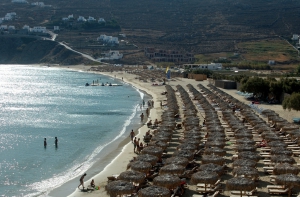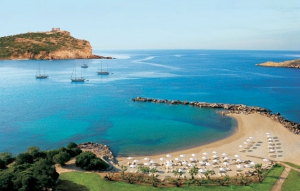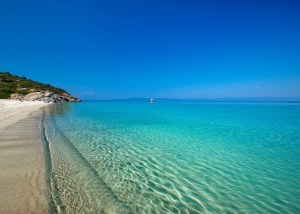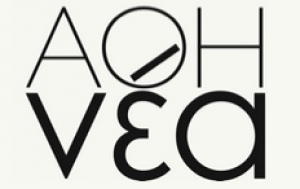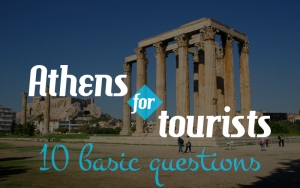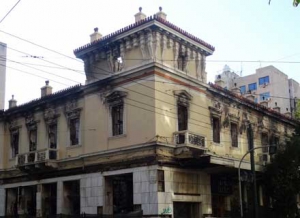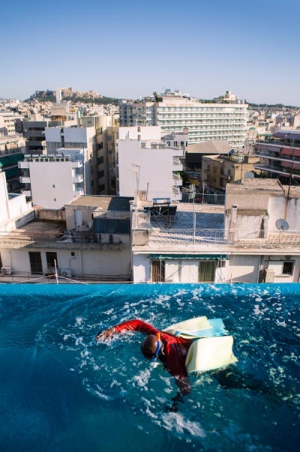BUSINESS CENTRE
XpatAthens
Wednesday, 17 June 2015 14:26
Life's A Beach
It's hot. Finally. So hot that I'm complaining about it. This makes me happy. It also makes me want to pack it all in and plant myself on some hot sand somewhere, close enough to jump in the water when the sweat is just too much to bear.. Greek Summer is here!
'Are there beaches in Athens??' Why, yes, dear tourist. There are plenty. Some of them are even nice! And some others are... less nice.
Close to the city-centre, I've been to Akanthus a couple times. It is an 'all day beach bar' along the Alimos seaside - with a lovely sandy beach, clear waters, and a decidedly cool vibe. There is a restaurant with a nice menu, music all day long, and a nighttime club transformation on most nights. It gets rather busy, especially on weekends. But if you go early enough, it's one of the nicer spots close to the city.
There are many beaches along the Athenian Rivera (as entire coastal strip has been branded). The further south you go, the more crystal clear the water becomes, as the surroundings become less 'urban'. Or so one would think. There are some obvious places I would never (ever) swim - and plenty of others that would make me pause and think.
How is one to know about the cleanliness of the waters around Attica? There are a couple places to check for water quality. The Greek Centre for Environmental Research (ΠΑΚΟΕ - Πανελληνιο Κεντρο Οικολογικών Ερευνών) recently released its ratings of Attica's beaches, based on its scientific measurements of water quality. Some people have commented on the ratings, saying that they are biased - you can judge for yourselves.
For an alternative version, with interactive map, try the Clean Beaches site - outlined below (also in English).
Whatever you choose to believe, have your wits about you and don't bunk down in the first place with a sandy stretch of beach. Take good care and enjoy the summer!
Until next week,
Jack
Beach Report (ΠΑΚΟΕ)
(in Greek, but Google translate can help here - and most of the beach names can be easily recognized)
Clean Beaches
Akanthus
Leof. Poseidonos, Kalamaki, Athens
+30 210 968 0800
www.akanthus.grFor more on what beaches are not recommended for swimming in Athens click HERE.
For ideas on great beaches that are highly recommend for swimming in and around Athens click HERE.
Published in
My Week In Athens
Tagged under
Wednesday, 17 June 2015 07:00
Greek Spirits & Liqueurs ~ The Ultimate Mediterranean Aperitif
Their flavours are unique. Their essence feels like Greece and summertime. Ouzo, raki, tsipouro and masticha: among the wide selection of Greek products, three famous spirits and a liqueur are eager to reveal their secrets.
Greek Ouzo
Ouzo is considered the national drink of Greece. In technical terms ouzo is either produced by partial distillation or the admixture of plain alcohol with aromatic herbs. The best ouzos are of course the distilled ones with the main flavour being imparted by anise seeds, though other aromatics are often added, such as masticha from Chios, cinnamon, cloves or fennel, depending on the brand. Each location prides itself on its ouzo but the most famous are from the island of Lesvos and from Tyrnavos in Thessaly.
Ouzo is ideally served chilled, with or without ice, though many add water which releases the essential oils from the anise, turning the drink milky and heightening the aromas. You should always add ice or water to already poured ouzo and not the other way around.
Though ouzo is delightful with many kinds of traditional Greek meze, like a good ladotyri from Zakynthos or Mytilini or a kopanisti from Mykonos or Tinos, it is best known for its affinity for strong-flavoured seafood such as the octopus mentioned above or marinated anchovies. Spicy pickled peppers also go well.
Traditional Raki and Tsipouro
Apart from ouzo, Greece is known for another pair of considerably stronger distilled local drinks, often confused with one another, raki and tsipouro. Frequently homemade, production peaks in the autumn after the grape-harvest with celebrations centred around the great distillation cauldrons.
Tsipouro is a traditional product that comes from mainland Greece while raki is from Crete. Both are made from grapes not destined for wine-making yet still capable of producing quality distilled spirits. The main differences among them are the degree of alcoholic content and the addition or not of anise seed, which is often added to tsipouro but never to raki.
Tsipouro with anise has pride of place in the tsipouro bars of Volos where it accompanies traditional delicacies from the region and Thessaly in general. Drink it either chilled or with ice.
Potent raki is enjoyed by Cretans of all ages, usually in shot glasses either chilled or at room temperature. They tend to accompany it with traditional products of Crete like cheese, local preserved meats, roasts or whatever else arrives at table including traditional sweets and pies. No excuse is needed to pour a glass at any hour of the day or night.
To read more, please visit: Discover Greece
Published in
Greek Food & Diet
Tagged under
Wednesday, 17 June 2015 07:00
Tears As Greek State TV Returns To Air After Austerity Shutdown
Exactly two years after the state broadcaster was abruptly shut down by the previous government, ERT began broadcasting again in place of its successor NERIT.
Employees at Greece's state television ERT hugged each other and cried on Thursday 11th June 2015 as the channel aired its first broadcast in two years, after it was shut down under one of the previous government's most drastic austerity measures.
Leftist Prime Minister Alexis Tsipras, who is racing to reach a cash-for-reforms deal with the European Union and IMF, had called ERT's closure "a great wound" of his country's bailout. He made its reopening one of his priorities as part of efforts to roll back cuts demanded by the lenders.
Employees gathered on the set in the early hours of 11th June 2015 in tears as anchors prepared to present the first early-morning talk show. Ahead of the programme, the channel played out footage of some of Greece's most famous landmarks and scenery, as the national anthem blared out.
"It's a special day for all Greeks, for philhellenes, for those who love Greece and for those who love freedom of information," anchor Nikos Aggelidis said at the start of the show. "We're nervous. We're very touched."
Visibly moved, his co-presenter Vasiliki Haina added in a shaky voice: "It's a special day for us, a difficult day." The news ticker at the bottom of the screen read: "The return of ERT two years since the black."
To read more, please visit: The TOC
Published in
Local News
Tagged under
Friday, 14 August 2015 16:00
Top Beaches In Athens
Athens was never famed for its beaches, but in recent years its becoming more and more popular to stay 'close to home' for fun in the sun. And why not? You can experience a small piece of island magic without ever having to set foot on a ferry. Here is a list of great beaches in Athens and within a 60 minute drive of the city.
Alimos beach – 11km away
Alimos beach is most famous for its fine sandy beachfront, located in close proximity to the city centre. It is very well connected with the local transportation and can be found 11 km south of Syntagma Square in the center of Greece’s capital. This means, of course, that Alimos beach is crowded most summer days – Athens is a city of more than six million, and all those people desperately want to cool off during the hottest summer days. Yet thanks to its size, there will always be enough space to set up an umbrella and do some sunbathing!
Vouliagmeni lake – 23km away
The Lake of Vouliagmeni is a natural lake 12 m deep, and a perfect gem along the Athenian Riviera. It is located a few meters from the sea: many people prefer to take a dive in its crystal-clear and extremely cool waters instead of the Aegean Sea's salty ones.
Vouliagmeni lake is a wonderfully relaxing place to visit during a hot summer day. You can enjoy a swim in its beautiful cool waters before getting a drink from the nice cafe right at the edge of the lake. You can even have your wedding there, and rent the whole place out if you can afford it!
Vouliagmeni beach – 23km away
Close to Vouliagmeni Lake and Limanakia lies the sandy beach of Vouliagmeni, one of the best-organized beaches which offers all types of beach facilities. Tennis and volleyball courts, a play area for children, a water slide, individual cabins and a restaurant are some of the features that make the area famous among Athenians. Nightclubs can also be found there, and on weekends there are plenty of chances to come across an open beach party so you can have a beer, dance with laid-back locals and experience a summer night in Athens.
Vouliagmeni beach – 23km away
Close to Vouliagmeni Lake and Limanakia lies the sandy beach of Vouliagmeni, one of the best-organized beaches which offers all types of beach facilities. Tennis and volleyball courts, a play area for children, a water slide, individual cabins and a restaurant are some of the features that make the area famous among Athenians. Nightclubs can also be found there, and on weekends there are plenty of chances to come across an open beach party so you can have a beer, dance with laid-back locals and experience a summer night in Athens.
Limanakia – 23km away
Vouliagmeni lake and the beach of Limanakia, meaning “small ports” in Greek, are separated by the seaside road that connects the city of Athens with Cape Sounion, mentioned above. And by the way, this route makes for the best possible seaside road-trip in the Attika region. A visit to the Lake means that you can also take a dive in the Aegean Sea simply by crossing that road. Limanakia is not an actual beach: rather, it is the rocky edge of the land on which Athens is built. However, as it is easily accessible, many Athenians head there to cool off simply by jumping off the small rocks to the cool waters of the Aegean and then climbing back up. Please remember that you can only do that when the waters are calm, as a heavy sea will make climbing up very dangerous.
Cape Sounion beach – 65 km away
Let’s go a little bit further this time: 56 kilometers away from Athens city center, to Cape Sounion, as it is truly an amazing site that should not be missed during your vacation in Athens. The sight of this splendid rocky promontory rising out of the Aegean is one of the best in Athens. At its highest point one can see the Temple of Poseidon, which was originally constructed in around 600 BCE, and rebuilt by Pericles in 440 BCE following its destruction by the Persians in 480 BCE. The Temple of Poseidon at Sounion is a must-see for travelers to Athens, and luckily for them there is a really nice beach located a few hundred meters away from the Temple’s entrance. If you want to spend the night, there are also numerous luxury and budget hotels nearby!
Legrena beach – 64 km away
Legrena is the last beach before reaching Sounion, and the Templae of Poseidon lies a few meters further down the road. The beach is located 60 km southeast of Athens and 3km west of Sounion, and for many meters surrounded by a protected cove. This beach is totally disorganized, but one of the cleanest in Athens and quite unspoilt. There are many taverns and cafeterias in the wider region, where you can enjoy a coffee or a delicious meal by the sea. It can get a bit crowded on weekends but it’s perfect during the week days.
Porto Germeno – 60km away
Porto Germeno, whose real name comes from the ancient settlement of Aigosthena, in antiquity used to be the port of Megara at Corinthiakos Bay. Porto Germeto is also a long beach, located 60 kilometers west of Athens' city center. The beach is not very organized, but it is pretty popular and often busy. This is especially true on weekends, when local residents come to enjoy the sea. The waters on this side of Athens are spectacular and island-like, making Porto Germeno one of the best beaches for anyone who loves crystal-clear, cool waters. It is also one of the most family-friendly beaches in Attika.
To read this article in full, please visit: GBTimes
Porto Germeno – 60km away
Porto Germeno, whose real name comes from the ancient settlement of Aigosthena, in antiquity used to be the port of Megara at Corinthiakos Bay. Porto Germeto is also a long beach, located 60 kilometers west of Athens' city center. The beach is not very organized, but it is pretty popular and often busy. This is especially true on weekends, when local residents come to enjoy the sea. The waters on this side of Athens are spectacular and island-like, making Porto Germeno one of the best beaches for anyone who loves crystal-clear, cool waters. It is also one of the most family-friendly beaches in Attika.
To read this article in full, please visit: GBTimes
Published in
City Discovery
Tagged under
Monday, 15 June 2015 13:18
Where Not To Swim In & Around Athens
The incredible deep blue of Greece is known the world over, but there are spots in and around Athens (Attica region) where swimming is not recommended. The National Center of Ecological Research (PAKOE) analyzed the seawater from May 2-25, 2015 (taking three samples from every site), at 151 beaches around Attica and found that 55 of these were unfit for swimming. Below is the complete list - the names outlined in RED are unfit for swimming. All of the others listed are fit for swimming.
Two helpful websites that you may like to consult are:
Beach Report (ΠΑΚΟΕ): www.beachreport.gr/attica-clean-beaches
(in Greek, but Google translate can help here - and most of the beach names can be easily recognized)
Clean Beaches: http://en.cleanbeaches.gr/
Two helpful websites that you may like to consult are:
Beach Report (ΠΑΚΟΕ): www.beachreport.gr/attica-clean-beaches
(in Greek, but Google translate can help here - and most of the beach names can be easily recognized)
Clean Beaches: http://en.cleanbeaches.gr/
AREA: SOUTH EVOIKOS GULF
Lighthouse
Ouzeri Paradeisos
Avlida (Start of Beach)
Agrileza (Navy Club)
Halkoutsi (Eagle’s nest)
Halkoutsi (Officer’s Blub)
Halkoutsi (Saloon)
Halkoutsi (200m after the playgound)
Halkoutsi (200 meters after the Evoiko Sea Center)
Halkoutsi (200 meters after the tavern at Ippokratous Street)
Halkoutsi Port
Avlida (End of beach)
Dilesi (Start of Beach)
Dilesi (Middle of Beach)
Dilesi (end of beach)
Finikon and Narkissou
Finikon and Agrambelis
End of the sea lake of Halkoutsi
Nea Palatia
Skala Oropos
Atlantis Club
Oropos Municipal Conservatory
Oropos Beach
Paradeisos Fish Tavern
Beach Faros (Lighthouse)
Tavern Before the Lighthouse
Oropos Hotel
Despo Beach
Baglaras Tavern Beach
Agios Apostolos Crossing
Alkyonis Hotel
Flat with Fountain (Syntrivani)
Flat Pefki
Kiladas Community Beach
Cine Vlastos Beach
Nisiotiko Group Flat
Beach near Galini Flat
Pizza Ascot Beach near the community of Agia Barvara
Panorama Agios Apostolos (near Koumbakitis Real Estate Agent)
AREA: SARONIC GULF
Themistokleous Coast
Freattyda
Votsalakia
Castella
Floisvos
Edem
Alimos Beach
Agios Kosmas
Start of Glyfada Beach (Palace Hotel)
Astera Glyfada
Apollonies Coast, Voula
Voula Beach
Viva Mare Cafe Beach
Kavouri Coast Maritine Ltd
Kavouri Coast Divani Palace
Start of Vouliagmeni
Vouliagmeni 200 meters inward
Vouliagmeni Coast Asteras (Laimos)
Asteras Vouliagmenis B
Vouliagmeni Coast Okeanida
Vouliagmeni Coast 100m
Winter Swimmer’s Coast
End of Vouliagmeni
Limanakia
Varkiza, Mistral Stop
Varkiza Vrahakia
Varkiza Haagen Daz
EOT Varkiza
Varkiza Flower Show
Varkiza Beach (Start)
Varkiza NAOBB School of Windsurfing
Koropi Sports Center
Agia Marina Tavern Galazio Kyma
End of Agia Marina
Agios Dimitrios
Lagonisi Blue Coast (Galazia Akti)
Lagonisi Christofylakis (Kalyvia)
Lagonisi Delao
Saronida Building No. 46
Saronida Edem
Saronida Show
Saronida Zefyros Bar
Anavyssos Mavro Lithari
Agios Nikolaos A & B
Fokaia A & B
Thymari A & B
Legrena Sounio A & B
AREA: SCHINIAS – LAVRIO
Schinias – Pefki (start)
Schinias – Sports Center
Schinias End
Marathon Taverns
Marathon End
Nea Makri (Trata Tavern)
Nea Makri End
Zoumberi
Agios Andreas
Kyani Akti
Mati
Kokkino Limanaki
Rafina A 300 m from port
Rafina B
Loutsa
Artemida
Loutsa Cafe
Vravrona
Porto Rafti
Avlaki Start
Avlaki EOT
Kakia Thalassa
Daskalio A
Daskalio Beach Bar Coco-Loco
Syri A
Syri B
Lavrio – Akti Pantanela
Lavrio Public Power Corporation
AREA: WEST ATTICA
Perama
Aspropyrgos
Elefsina Port
Elefsina 500 meters after port
Loytropyrgos Hotel
Akti Nerakia
Music Club Ladadika
Neraki after Softex
Nea Peramos 50 m before target school
Nea Peramos Port Ferry Boat for Salamina
Kakia Skala
Kinetta Coast
Kinetta Hotel Bousoulas
Kinetta End
Agioi Thodoroi Avin Central Road
Xanikian Hotel, Agioi Thodoroi
Agioi Thodoroi End of 1st Beach
Agioi Thodoroi, Saronikou Road
60km Athens-Corinth Highway
Motor Oil
Port Motor Oil
Sousakia Camping
Isthmia Community of Cavos
Isthmia Kalamaki
Isthmia Alantis
Loutraki 300m from Casino
Source: Protothema.gr
Published in
Local News
Tagged under
Friday, 12 June 2015 16:10
An αθηΝΕΑ Kind Of Week
Introductions first. αθηΝΕΑ (pronounced a-
While we were patiently awaiting some solid news on the financial future of Greece to emerge from the negotiation that would not end, we had some time to read. We started with this piece in the FT, in which an Italian economist basically tells Greeks to reform or kindly leave the Eurozone. What did the international media’s Greek darling, our finance minister Yannis Varoufakis, have to say about it? He sent out some pretty contradictory messages to our lenders, basically asking Germans to lead, while accusing them of being butchers. Oh, and we - as in the Greeks - also managed to piss off our only remaining ally in Brussels, Jean-Claude Juncker, so there’s that.
Enough politics, what else went on this week? For one thing we felt extremely jealous of our friends in London, who get to visit this participatory art exhibition. We also got a wonderful book recommendation (Primates of Park Avenue), about women who have it all and also get bonuses when their kids perform well in school, as well as a ton of music recommendations, some taking us back to the late nineties, others more contemporary and some that truly made us wonder!
What are your thoughts on the Caitlyn-Jenner-breaks-the-
As we speak, we are frantically packing for a lovely weekend somewhere warm, and are wondering if there’s any chance our voyage could be as fun as that of EasyJet passengers who witnessed Kate Moss calling their pilot a basic b*tch. Speaking of the female bro, here’s a College Humor video-guide on How To Tell if You’re a Basic B*tch, in case you were wondering.
Let’s leave vulgarity aside and once again focus on the serious stuff: the G7 vowed to finally do something about climate change, which according to Oliver Burkeman is kind of a must since we, as humanity, are a bunch of climate change deniers at heart, ‘hardwired to shirk existential challenges'.
Last but not least, we got some helpful tips on how to avoid mosquito bites (hint: don’t move, don’t drink, don’t speak to anyone) and learnt from the Buddha of breaststroke himself that maybe our swimming skills weren’t so advanced after all.
Want to hear more from a8hNEA? Let us know by email: ideas@xpatathens.com.
Published in
My Week In Athens
Tagged under
Monday, 15 June 2015 07:00
Athens For Tourists
Is it safe? Is it worth it? How many nights should I book? These are the most frequent questions we receive from tourists wondering whether they should include Athens in their Greek holiday schedule or not. In this article, we have gathered most such questions and… their answers. So, here is how we introduce Athens for tourists.
# How many days?
Generally 2 or 3 nights the most are enough to see Athens. Until few years ago, many visitors would arrive in Athens airport and then go directly to the port to board the ferry to the islands. Now the trend has changed and tourists choose to spend a couple of days sightseeing in Athens and then continue for beach holidays to the islands.
# Best time to visit
Most visitors come to Athens in tourist season, which lasts from April to October in Greece. However, over the last years, due to good weather and flights frequency from abroad, Athens is growing into a great city break during autumn and winter months. Weather in winter season is great in Athens, with average temperature 8-15oC and many days of sunshine. Hotels are open all year round and room rates are cheaper than in high season. Sights and museums are also open every day (except Monday) until 15:00 in the afternoon. July and August are busy but very hot months, so make sure you have hat and plenty of water during your walks.
# Is it safe?
Although there is some concern about safety in Athens, the truth is that the Greek capital remains one of the safest places in the world. Visitors just have to choose accommodation in a safe area, such as Syntagma Square or Plaka, and avoid places with higher criminality, especially at nights. Such places with higher criminality rate are Omonoia Square, Viktoria Square or Metaxourgeio. Also have your mind for pick pocketing in crowded places, like buses, metro or the port.
To read more, please visit: Greeka
Published in
Travel Greece
Tagged under
Monday, 15 June 2015 07:00
Fire-Scarred Central Athens Cinemas To Receive Facelift
Two historical movie theaters in downtown Athens could be fully operational once more by the end of the year, if all goes according to plan in an initiative of the Museum of the City of Athens and the Vouros-Eutaxias Foundation with the support of Athens Mayor Giorgos Kaminis, who hopes that their relaunch could signal the rebirth of central Stadiou Street – once a vibrant shopping and entertainment thoroughfare and now a desolate stretch of closed shops.
It bodes well for the plan – though few know this fact – that the interior areas of both the Attikon and Apollon cinemas were untouched by the firebombs thrown by protesters in February 2012 during a violent riot that claimed the lives of three employees at Marfin Bank, located nearby on Stadiou Street. The exteriors of the two movie theaters, which are both located in the same once-beautiful block, were badly damaged.
“The fire was stopped at the last minute thanks to the efforts of a handful of firefighters and the cinemas’ operator, Giorgos Tsakalakis, and members of his family and staff on that fateful day,” says Antonis Vogiatzis, president of the board of directors for the Museum of the City of Athens, which is located nearby.
To read more, please visit: ekathimerini
by Nikos Vatopoulos
Published in
Local News
Tagged under
Monday, 15 June 2015 07:00
Brad Pitt And Angelina Jolie To Buy A Greek Island?
Hollywood couple Brad Pitt and Angelina Jolie are reportedly preparing to buy the Greek island of Gaia (Sofia Island) located in the Echinades complex of the Ionian.
According to the Washington Post, which mentions US OK! magazine as its source, said that the couple are reportedly thinking about splashing out $4.7 million on the entire island of Gaia (Sofia) so they can enjoy more private holidays together.
The Washington Post also noted that the 43-acre island has secured planning permission for six villas.
To read more, please visit: Greek Travel Pages
Published in
Greece In The News
Tagged under
Wednesday, 10 June 2015 07:00
‘X Apartments’ Offers Glimpse Into Lives Of Others
Dionysis, a 63-year-old Greek pensioner, dances to electronica with Austrian performance artist Doris Uhlich in a small room, just two by three meters, in Kolonos. “I’ve gone back in time,” he says.
Barry Amadou, a 24-year-old from Guinea, tells his story of constant migration, which he illustrates on a map with pieces of string and photographs showing all the places he’s been in his life, placed on a small table in his basement apartment. “The first time I ate McDonald’s was in Germany and it was bought for me by a policeman,” he remembers.
Anna from Moldova has reproduced a slice of home on the rooftop of an apartment building on Amerikis Square: She has planted a small garden on the roof and has arranged dozens of plastic flowers around the displays of photographs and religious icons adorning the walls of the building’s old washroom, now her apartment. “If you have hands, feet, can work and walk, then you’re the richest person in the world,” she says, explaining her philosophy on life.
Paola Revenioti, a 56-year-old transsexual, offers us coffee and answers questions from her couch in a carefully decorated apartment on Liosion Street, where she lives with her dog Lucy. The headquarters of far-right party Golden Dawn is nearby but she makes a point of never passing in front of the building even though she has not heard of any party members giving the Somalis who play basketball across the street any grief.
Lambros, whose parents are both Greek, came from Brazil as a young man in 1997. He worked in various hotels (he speaks five languages) until he lost his job and home. He has spent the last two years living at the municipal shelter, “until the Big Man opens a door,” he explains, fingering a small cross that hangs around his neck. “My dream is to be able to rent a studio apartment again.”
What is life like in some of Athens’s most run-down neighborhoods? On the one hand we have a swimming pool on the rooftop of a pretty building in Metaxourgeio, on the other, a dank basement in Kypseli – apartments built haphazardly by fortune-hunting contractors and elegant inter-war buildings testifying to a rich architectural past.
The “X Apartments” initiative, organized as part of the Fast Forward Festival by the Onassis Cultural Center a couple of weeks ago, brought us face to face not just with veiled truth but also with vital lies by organizing visits to 15 homes along two separate routes for two days. The first started at the Attiki metro station and took in Kypseli. The second began in Metaxourgeio, crossed the tracks at Larissis train station and ended in the district of Kolonos. For about six hours in total, the spectator-participants were released in pairs with a detailed itinerary to meet and explore the homes of foreign and Greek residents. We asked questions and they asked questions. We chatted, we drank a liqueur in one house and had Syrian sweets in another. It all seemed fast, condensed, like a movie in fast-forward.
To read more, please visit: ekathimerini
by
Maria Katsounaki
by
Maria Katsounaki
Published in
Local News
Tagged under


